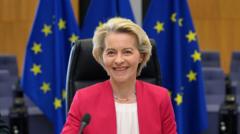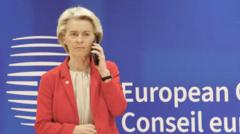The European Union's General Court mandated the disclosure of text messages between key officials and executives, highlighting the ongoing debate over governmental transparency in health matters.
**Court Rules in Favor of New York Times in Access to E.U. Vaccine Communication**

**Court Rules in Favor of New York Times in Access to E.U. Vaccine Communication**
A landmark ruling promotes transparency in the European Union regarding Covid-19 vaccine negotiations.
In a significant legal decision that may influence the European Union's transparency standards, the General Court of the E.U. ruled in favor of The New York Times on Wednesday, determining that the European Commission's refusal to release text messages related to the Covid-19 vaccine negotiations was unjustifiable. The ruling emerged from a comprehensive review of a request for communications between Ursula von der Leyen, the president of the European Commission, and Albert Bourla, the CEO of Pfizer, during their discussions in 2021 regarding vaccine contracts.
The court's judgement centered on the classification of these text messages as public documents under E.U. law and whether their retention and disclosure were necessary. The Commission had argued that the messages were ephemeral and fell outside the scope of essential transparency requirements. However, the judges contended that the Commission needed to provide substantial reasoning to support its stance that these communications did not hold vital information.
"The commission cannot simply claim it lacks the requested documents; it is required to present credible explanations that allow the public and the court to comprehend the absence of these documents," the judges emphasized. They further criticized the Commission for failing to articulate convincingly why the text messages exchanged during the procurement of Covid-19 vaccines were deemed inconsequential, ultimately reinforcing the notion of accountability in public negotiations.
This ruling not only embodies a pivotal moment for transparency regarding public health initiatives but could also reshape the expectations surrounding government communications moving forward, prompting a broader reevaluation of how such records are maintained and disclosed across the European Union.
The court's judgement centered on the classification of these text messages as public documents under E.U. law and whether their retention and disclosure were necessary. The Commission had argued that the messages were ephemeral and fell outside the scope of essential transparency requirements. However, the judges contended that the Commission needed to provide substantial reasoning to support its stance that these communications did not hold vital information.
"The commission cannot simply claim it lacks the requested documents; it is required to present credible explanations that allow the public and the court to comprehend the absence of these documents," the judges emphasized. They further criticized the Commission for failing to articulate convincingly why the text messages exchanged during the procurement of Covid-19 vaccines were deemed inconsequential, ultimately reinforcing the notion of accountability in public negotiations.
This ruling not only embodies a pivotal moment for transparency regarding public health initiatives but could also reshape the expectations surrounding government communications moving forward, prompting a broader reevaluation of how such records are maintained and disclosed across the European Union.





















